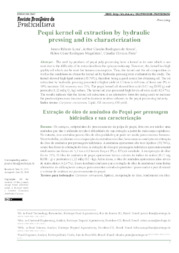Pequi kernel oil extraction by hydraulic pressing and its characterization.
Pequi kernel oil extraction by hydraulic pressing and its characterization.
Author(s): LIMA, J. R.; SOUZA, A. C. R. de; MAGALHAES, H. C. R.; PINTO, C. O.
Summary: The seed by-products of pequi pulp processing have a kernel in its core which is not used due to the difficulty of its extraction from the spinous endocarp. However, this kernel has high quality oil which can be used for human consumption. Thus, the kernel and the oil composition as well as the conditions to obtain the kernel oil by hydraulic pressing were evaluated in this study. The kernel showed high lipid content (55.76%), therefore being a good source for obtaining oil. The oil extraction by hydraulic pressing presented a higher yield at 5.5 tons to 6.0 tons of force and 9% to 10% moisture. Oil recovery was 75%. The pequi kernel oil showed low acid (0.17 mg KOH/g) and peroxide (1.22 mEq O2/kg) values. The kernel oil also presented high levels of oleic acid (42.47%). The results indicate that the kernel oil extraction is an alternative form for using seeds to increase the producer/processor income and to decrease residue volumes in the pequi processing industry.Index terms:Caryocar coriaceum, Lipid, Oil recovery, Oil yield.
Publication year: 2020
Types of publication: Journal article
Unit: Embrapa Food Technology
Observation
Some of Embrapa's publications are published as ePub files. To read them, use or download one of the following free software options to your computer or mobile device. Android: Google Play Books; IOS: iBooks; Windows and Linux: Calibre.
Access other publications
Access the Agricultural Research Database (BDPA) to consult Embrapa's full library collection and records.
Visit Embrapa Bookstore to purchase books and other publications sold by Embrapa.

